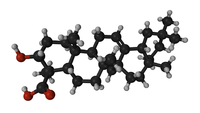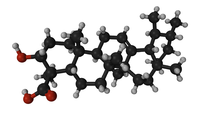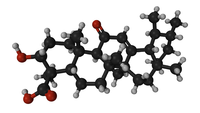
Boswellic acid
Encyclopedia






Triterpene
Triterpenes are terpenes consisting of six isoprene units and have the molecular formula C30H48.The pentacyclic triterpenes can be classified into lupane, oleanane or ursane groups.Animal- and plant-derived triterpenes exist, such as:*squalene...
molecules that are produced by plants in the genus Boswellia
Boswellia
Boswellia is a genus of trees known for their fragrant resin which has many pharmacological uses particularly as anti-inflammatories. The Biblical incense frankincense was probably an extract from the resin of the tree, Boswellia sacra....
. Like many other terpenes, boswellic acids appear in the resin
Resin
Resin in the most specific use of the term is a hydrocarbon secretion of many plants, particularly coniferous trees. Resins are valued for their chemical properties and associated uses, such as the production of varnishes, adhesives, and food glazing agents; as an important source of raw materials...
of the plant that exudes them; it is estimated that they make up 30% of the resin of Boswellia serrata
Boswellia serrata
Boswellia serrata is Indian frankincense or Salai. It is found in Rajasthan, Madhya Pradesh & Andhara Pradesh in India.- Medical usage :...
.
Structure
The boswellic acids are organic acidOrganic acid
An organic acid is an organic compound with acidic properties. The most common organic acids are the carboxylic acids, whose acidity is associated with their carboxyl group –COOH. Sulfonic acids, containing the group –SO2OH, are relatively stronger acids. The relative stability of the conjugate...
s, consisting of a pentacyclic triterpene, a carboxyl group and at least one other functional group. Alpha-boswellic acid and beta-boswellic acid, C30H48O3 both have an additional hydroxyl group; they differ only in their triterpene structure. Acetyl-alpha-boswellic acid and acetyl-beta-boswellic acid, C32H50O4, replace the hydroxyl group with an acetyl
Acetyl
In organic chemistry, acetyl is a functional group, the acyl with chemical formula COCH3. It is sometimes represented by the symbol Ac . The acetyl group contains a methyl group single-bonded to a carbonyl...
group.
Other boswellic acids include the keto-boswellic acids and their acetyl counterparts.
Uses
Beta-boswellic acid, keto-beta-boswellic acid, and acetyl-keto-beta-boswellic acid (AKBA) have been indicated in apoptosisApoptosis
Apoptosis is the process of programmed cell death that may occur in multicellular organisms. Biochemical events lead to characteristic cell changes and death. These changes include blebbing, cell shrinkage, nuclear fragmentation, chromatin condensation, and chromosomal DNA fragmentation...
of cancer cells, in particular brain tumors and cells affected by leukemia
Leukemia
Leukemia or leukaemia is a type of cancer of the blood or bone marrow characterized by an abnormal increase of immature white blood cells called "blasts". Leukemia is a broad term covering a spectrum of diseases...
or colon cancer.
Acetyl-boswellic acids also exhibit anti-inflammatory
Anti-inflammatory
Anti-inflammatory refers to the property of a substance or treatment that reduces inflammation. Anti-inflammatory drugs make up about half of analgesics, remedying pain by reducing inflammation as opposed to opioids, which affect the central nervous system....
behaviour by inhibiting leukotriene
Leukotriene
Leukotrienes are fatty signaling molecules. They were first found in leukocytes . One of their roles is to trigger contractions in the smooth muscles lining the trachea; their overproduction is a major cause of inflammation in asthma and allergic rhinitis...
synthesis. To be specific, it inhibits the activity of the enzyme 5-lipoxygenase
Lipoxygenase
Lipoxygenases are a family of iron-containing enzymes that catalyse the dioxygenation of polyunsaturated fatty acids in lipids containing a cis,cis-1,4- pentadiene structure. It catalyses the following reaction:...
through a non-redox
Redox
Redox reactions describe all chemical reactions in which atoms have their oxidation state changed....
reaction. Clinical trials have investigated the effectiveness of boswellic acids in treating ulcerative colitis
Ulcerative colitis
Ulcerative colitis is a form of inflammatory bowel disease . Ulcerative colitis is a form of colitis, a disease of the colon , that includes characteristic ulcers, or open sores. The main symptom of active disease is usually constant diarrhea mixed with blood, of gradual onset...
, but a study on chemically induced colitis in mouse models showed little effectiveness. This latter study also linked large doses of boswellic acids to hepatotoxicity
Hepatotoxicity
Hepatotoxicity implies chemical-driven liver damage.The liver plays a central role in transforming and clearing chemicals and is susceptible to the toxicity from these agents. Certain medicinal agents, when taken in overdoses and sometimes even when introduced within therapeutic ranges, may injure...
and increased lipid accumulation. However, low doses of Boswellia serrata extract may have hepatoprotective effects.
Boswellic acids are also thought to decrease the symptoms of asthma
Asthma
Asthma is the common chronic inflammatory disease of the airways characterized by variable and recurring symptoms, reversible airflow obstruction, and bronchospasm. Symptoms include wheezing, coughing, chest tightness, and shortness of breath...
; a small 1998 placebo-controlled trial of Boswellia extract for the treatment of asthma showed good results. Boswellia extracts are sold in tablet
Tablet
A tablet is a pharmaceutical dosage form. It comprises a mixture of active substances and excipients, usually in powder form, pressed or compacted from a powder into a solid dose...
, capsule and tincture
Tincture
A tincture is an alcoholic extract or solution of a non-volatile substance . To qualify as a tincture, the alcoholic extract is to have an ethanol percentage of at least 40-60%...
form, but no dosage guidelines have been developed. The risk of hepatotoxicity due to Boswellia administration has not been assessed.

